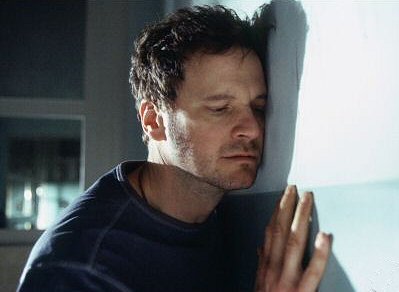Mr D'Arcy looks on the dark side
Steve Pratt talks to
Colin Firth about playing a
man haunted by death after a series of roles
as the romantic leading man
|

|
No one, certainly
not Colin Firth, could have imagined that his wet shirt moment in the
BBC's Pride And Prejudice
would set female pulses racing and cast him as a romantic leading man.
His roles since taking that dip as D'Arcy in Jane Austen's classic have
done little to part company with that image, being either rom-coms like
Love Actually and Bridget Jones's Diary or costume
pieces such as The Importance Of
Being Earnest and Girl With A
Pearl Earring.
Firth, you sense, is a reluctant heartthrob, which is why his new film,
the psychological thriller Trauma,
is a relief, being a return to the quirkier contemporary parts he
played earlier in his career. His character Ben wakes from a coma to
find his wife is dead and he's implicated in the murder of a pop star.
Then things get worse.
The actor previously worked with director Marc Evans on a Ruth Rendell
thriller adaptation for TV. "It was not entirely dissimilar territory
and I felt very at home in this sort of film, " explains Firth. "I felt
like coming in from a very long time out, from a period I was not very
comfortable in.
It's probably a terrible misfit with what other people are comfortable
with me being. I felt very much this is where I belong with Trauma.
"It's not often that someone whose work you respond to is a mate. We've
talked in the intervening years about the kind of film we wanted to do
and were in the process of developing ideas when this came along."
Themes of obsession and fan adulation are both touched on in Trauma. Firth has encountered both
since his profile was raised by Pride
And Prejudice. He's obviously reflected on the subject before,
although playing someone who's the obsessor made him look on it
differently. "You take someone as lonely as this character, who has
absolutely no intimacy at all in his life, and you have a media now
which is completely comprehensive. Everyone is literate in the
available media now. Singers come out of every TV screen and radio.
Actors are making eyes at you, trying to reach you. Everyone has this
way of trying to communicate media-wise. And if you're a very, very
lonely person, you're going to be vulnerable to that, " he says.
"So there's the artist trying to bare their soul to the camera, and
needy, unstable people on the other end of that. It's potentially a
dangerous business. On the one hand you want to reach people, trying to
make that connection which sometimes you possibly wouldn't make with
the people you are intimate with in your life. There are things actors
are capable of in front of the camera which they're not capable of at
home.
"It's a bizarre relationship. Then there's some complete stranger in
the street, who's on the other end of that experience. You've never
invited them to have any relationship with you whatsoever. You can't
offer them anything more but, if they've been destablised by something
in their own lives, it's as if you've promised them something. They can
create that confusion. If you come into people's living rooms with very
personal stuff, you can't be surprised if people in the living room
take it personally."
Filming Trauma was "fun but
all encompassing", working long days, six days a week. It took time to
leave behind the dark corridors and ghosts that were part of the story
but he didn't feel traumatised himself. "It's fun to play around in the
dark. I craved it. I missed it. In some ways I was attracted to it and
wanted to go back there, " he says.
His next film, the sequel to Bridget
Jones's Diary, is lighter fare. Doing comedy this time was
easier because everyone involved knew each other.
"As soon as we announced we were doing it, it was like, 'Is that
wise?'. You have to tread a line . . . can this character get up and
walk around meaningfully and entertainingly? I wasn't sure until I saw
them do it, " he says.
|
